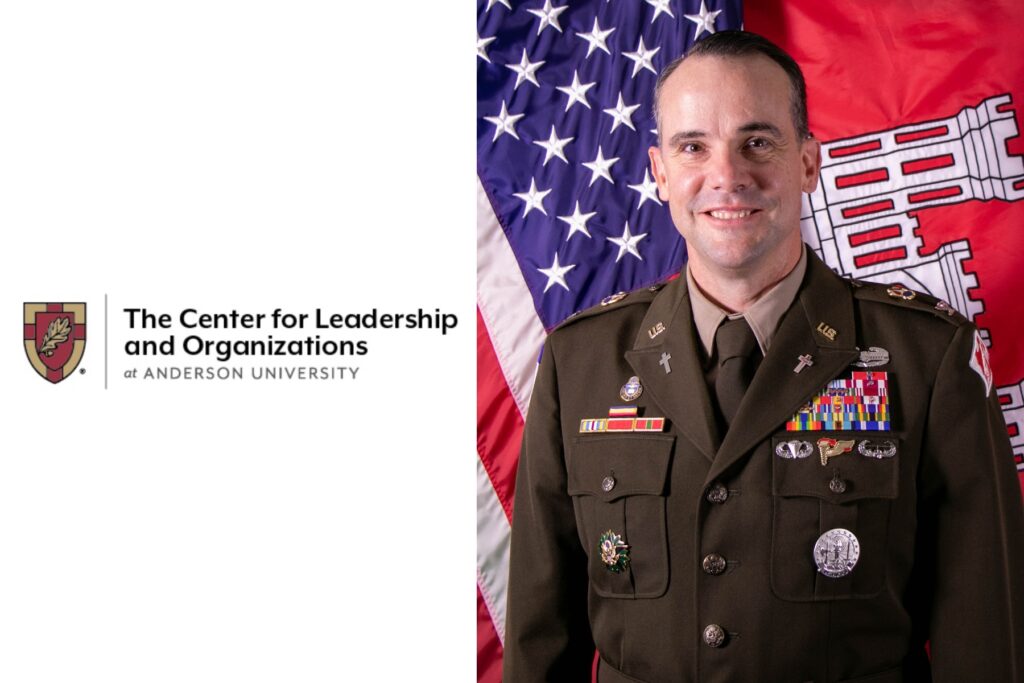“This is an exciting role for him, and a sign of what our students and graduates will be doing with this degree,” said Dr. Kyle Small, director of the Center for Leadership and Organizations. “Bailey is a remarkable student and focused on becoming a scholar and researcher; he is also growing as a leader. His presence in the program, alongside many of his peers, is exactly why I enjoy leading it.”
Bailey explained, “I will join the faculty of the Army War College, where I will then serve within a team of three to four instructors who lead a seminar of approximately 12-15 students. I will teach other classes during the electives period, but my focus will be within the Department of Command, Leadership, and Management. I will teach ethics, organizational design, and organizational leadership classes within this capacity. These topics dovetail well with what I have studied at Anderson University.”
Bailey noted that his students are military and civilian leaders with 20-plus years of experience leading in the military, other governmental agencies, non-governmental organizations and allied and partner nation militaries.
Bailey appreciates how the Anderson University Center for Leadership and Organizations aligns with his own professional goals; for example, the course on executive coaching, which helped him through the thought processes of asking questions to assist leaders in formulating goals, priorities and an action plan; and then implementing an accountability system for the execution and assessment of the action plan.
“I will be working with strategic leaders; they do not need someone to come in and give them a program. They need somebody to help them think things through; executive coaching is an ideal tool for that,” Bailey said.
Bailey entered the U.S. Army after graduating high school. He served as a maintenance soldier and noncommissioned officer before going to college to study biology and chemistry.
“I was in the ROTC program at the University of Texas El Paso because I love serving my country, and I was going to attend medical school. However, then I surrendered to ministry about halfway through that,” said Bailey, who became a Christian as a teenager through a Bible study at a Presbyterian church in his hometown. He received a master of divinity degree at Baylor University, then served in a small country church before re-entering the Army, serving for more than 20 years as a chaplain.
Bailey feels the chaplaincy has prepared him well for the role he is entering at the U.S. Army War College.
“I do not want to downgrade what we do in the spiritual sense or denigrate the import of what we do in a chapel, but the chapel is a leadership laboratory in many ways because you are leading people, and of course, you are leading through influence,” Bailey said. “You do not have command authority to make people come to church, but they choose to come because you positively influence them to grow spiritually, emotionally, intellectually, and relationally. You are leading through influence, hopefully, grounded in scripture.”
Bailey feels that his Ph.D. in leadership program from the Anderson University Center for Leadership and Organizations has helped him further hone his leadership skills.
“I would recommend this program for anyone who is looking at how to professionally develop themselves as an advisor on leadership, especially if they want to integrate faith with leadership, because this program does an excellent job of dovetailing faith into leadership in a way that is academically rigorous and grounded in the best academic studies of leadership and organizational behavior,” Bailey said. “Whether you are in a faith-based or non-faith-based organization, I believe this program is beneficial for helping develop informed leaders with honed analytical skills.”

